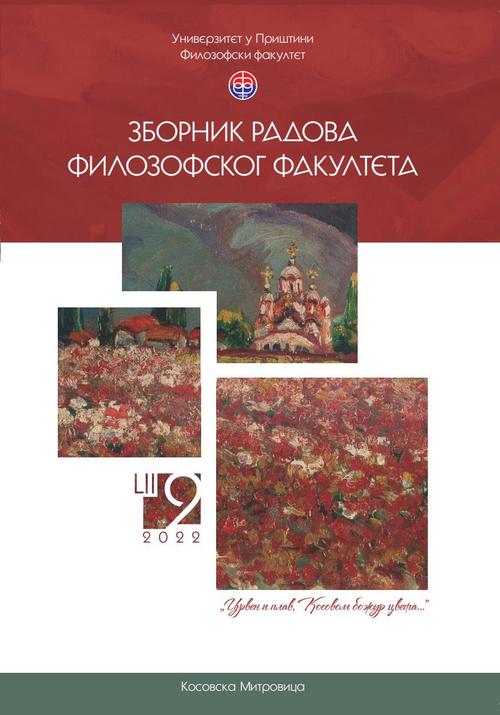Hesseov čitatelj koji više ne čita u kontekstu suvremenih medija
Sažetak
Članak se bavi analizom nekoliko Hesseovih eseja s time da se naglasak stavlja na esej O čitanju knjiga (On Reading Books) napisanom 1920. godine, a koji će se analizirati iz perspektive suvremene znanosti o književnosti, psihologije i neuroznanosti. Hesse je u svome eseju napravio klasifikaciju čitatelja književnosti te anticipirao nastanak „čitatelja koji više ne čita“ kao vrstu prosvijetljenoga čitatelja, ljudskoga bića kojemu je, zahvaljujući dubinskom i predanom razumijevanju emocija u književnosti, smisao njegova života nadohvat ruke, koji razumije što misli i osjeća, napose što osjeća. Dakle, to je čitatelj koji zaista razumije svoje emocije.
No u doba digitalnih medija, danas, nastaje nova verzija „čitatelja koji ne čita“, koji je, za razliku od osviještenoga Hesseova čitatelja, bahati i površni suvremeni čitatelj koji vjeruje da sve zna samo zato što može lako prići informacijama koje se zapravo niti ne trudi dubinski razumjeti, a o emocijama u književnosti
gotovo niti ne razmišlja. U drugom će se svome dijelu ovaj članak zbog toga nasloniti na još dva Hesseova eseja o čitanju književnosti, od kojih jedan anticipira utjecaj multimedije na čitanje te obrazložiti nastanak suvremenoga „čitatelja koji ne čita“. Točnije, pozabavit će se emocijama i načinima na koje književnost može potaknuti doživljaj i emocije u doba digitalne multimedije. Naime, ukoliko želimo osjećati i doživljavati tijekom
čitanja književnosti, trebamo razviti i kognitivni i emocionalni aparat koji je voljan i sposoban razumjeti ono što je pročitano, a suvremeni mediji kao da stoje tome na putu.
Dobro je uputiti na problem, no još je bolje ponuditi i mogućnost rješenja pa će u trećemu dijelu ovaj članak ponuditi nova/stara znanja o učincima čitanja naglas na razvoj naših emocionalnih i kognitivnih sposobnosti. Naravno, metode čitanja naglas u multimedijskome ruhu postoje, uspješne su pa će ovdje biti predstavljeno jedno istraživanje koje ide upravo u smjeru poticanja emocija i empatije metodom čitanja naglas.
Reference
Al Madi, N. S. & Khan, J. I. (2015). Is Learning by Reading a Book Better Than Watching a Movie? A Computational Analysis of Semantic Concept Network Growth During Text and Multimedia Comprehension. In: 2015 International Joint Conference on Neural Networks (IJCNN). Preuzeto sa: https://scihub.se/10.1109/IJCNN.2015.7280761 (28. 5. 2022).
Bartolucci, M. & Batini, F. (2020). Reading Aloud Narrative Material as a Means for the Student’s Cognitive Empowerment. Mind, Brain, and Education, 14 (3), 235–242.
Berrong, R. M. (2014). A Significant Source for the Madeleine and Other Major Episodes in Combray: Proust’s Intertextual Use of Pierre Loti’s My Brother Yves. Studies in 20th & 21st Century Literature, 38 (1), 1–17.
Bohn-Gettler, C. M. (2019). Getting a Grip: The PET Framework for Studying How Reader Emotions Influence Comprehension. Discourse Processes, 56 (5–6), 386–401.
Bohn-Gettler, C. M. & Rapp, D. N. (2014). Emotion during Reading and Writing. In: R. Pekrun & L. Linnenbrink-Garcia (Eds.), International Handbook of Emotions in Education (437–457). New York: Taylor & Francis.
Dillon, A. (1992). Reading from Paper Versus Screens: A Critical Review of the Empirical Literature. Ergonomics, 35 (10), 1297–1326.
Furenes, M. I., Kucirkova, N., Bus, A. G. (2021). A Comparison of Children’s Reading on Paper Versus Screen: A Meta-Analysis. Review of Educational Research, 91 (4), 483–517.
Ghosn, I. (2001). Nurturing Emotional Intelligence through Literature. Semantic Scholar. Preuzeto sa: https://www.semanticscholar.org/paper/Nurturing-Emotional-Intelligence-through-Ghosn/f4d14cb628b11c9f63526e4690292b-c316217e12 (8. 12. 2021).
Gillan, C. M. & Rutledge, R. B. (2021). Smartphones and the Neuroscience of Mental Health. Annual Review of Neuroscience, 44, 129–151.
Hesse, H. (1974). My Belief: Essays on Life and Art. New York: Farrar Straus & Giroux.
Hesse, H. (1979). Igra staklenih perli. Beograd: Narodna knjiga.
Hesse, H. (1984). Magija knjige. Novi Sad: Srpska čitaonica i knjižnica.
Hesse, H. (2003). Misli. Zagreb: Zagrebačka naklada.
Jabr, F. (2013). The Reading Brain in the Digital Age: The Science of Paper versus Screens. Scientific American. Preuzeto sa: https://www.scientificamerican.com/article/reading-paper-screens/ (5. 2. 2021).
Jopling, D. A. (2000). Self-Knowledge and the Self. New York: Routledge.
Lazzarich, M. i Čančar, A. (2020). Dječja lektira i novi mediji. Metodički ogledi, 27 (2), 149–170.
Peti-Stantić, A. (2019). Čitanjem do (spo)razumijevanja. Od čitalačke pismenosti do čitateljske sposobnosti. Zagreb: Naklada Ljevak.
Proust, M. (1981). Combray. Zagreb: Nakladni zavod Matice hrvatske.
Sabljak, Lj. (2021). Uloga emocija u procesu interpretacije književnoga djela vođenim čitanjem. Kroatologija: časopis za hrvatsku kulturu, 12 (2–3), 101–129.
Senawati, J., Suwastini, N. K. A., Jayantini, G. A. S. R., Adnyani, N. L. P. S., Artini, N. N. (2021). The Benefits of Reading Aloud for Children: A Review in EFL Context. Indonesian Journal of English Education (IJEE), 8 (1), 73–100.
Vladilo, I. (2002). Lektira – radost čitanja ili tortura. U: B. Šušnjić (ur.), Zbornik radova Proljetne škole školskih knjižničara (89–94). Novi Vinodolski – Rijeka: Ministarstvo prosvjete i športa Republike Hrvatske.
Detalji u vezi sa uređivačkom politikom, uključujući i autorska prava, dostupni su na sajtu SCIndeks.
http://scindeks.ceon.rs/journalDetails.aspx?issn=0354-3293

